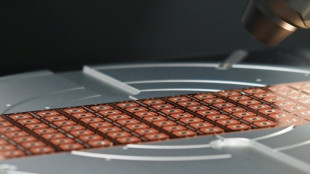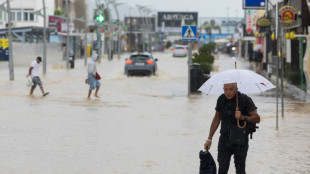
-
 India ready to rev up chipmaking, industry pioneer says
India ready to rev up chipmaking, industry pioneer says
-
Australian Rules axes 'centre bounce' after 130 years

-
 Rangers searching for Europa League respite, Villa visit Feyenoord
Rangers searching for Europa League respite, Villa visit Feyenoord
-
Crystal Palace soaring under Glasner ahead of European bow

-
 Asian stocks mixed, Wall St futures drop as US heads for shutdown
Asian stocks mixed, Wall St futures drop as US heads for shutdown
-
Suarez double in vain as Chicago sink Miami to clinch playoff berth

-
 England's 'outsiders' aim to break trophy drought at Women's Cricket World Cup
England's 'outsiders' aim to break trophy drought at Women's Cricket World Cup
-
Indigenous survivors recount past horrors at Canada residential school

-
 Hitmaker Max Martin back with Taylor Swift for 'Showgirl'
Hitmaker Max Martin back with Taylor Swift for 'Showgirl'
-
'Showgirl' conquers showbusiness: Taylor Swift releases 12th album on Friday

-
 Former Wallabies coach Cheika joins Sydney Roosters
Former Wallabies coach Cheika joins Sydney Roosters
-
South Korea posts record semiconductor exports in September

-
 Rugby World Cup draw set for December 3
Rugby World Cup draw set for December 3
-
Strong quake in central Philippines kills 19 as search ongoing

-
 Chelsea memories don't 'feed' Mourinho after return ends in defeat
Chelsea memories don't 'feed' Mourinho after return ends in defeat
-
OpenAI launches Sora 2 with TikTok-style app

-
 Nike shares rally on progress in turnaround
Nike shares rally on progress in turnaround
-
Liverpool lose to Galatasaray in Champions League, Chelsea beat Mourinho's Benfica

-
 Stars align for Louis Vuitton, Stella McCartney at Paris Fashion Week
Stars align for Louis Vuitton, Stella McCartney at Paris Fashion Week
-
Tigers down Guardians, Cubs edge Padres in baseball playoffs

-
 Mourinho's Benfica beaten on Chelsea return in Champions League
Mourinho's Benfica beaten on Chelsea return in Champions League
-
Beaches shut on Spain's Ibiza as downpours spark floods

-
 Liverpool slump to Champions League defeat at Galatasaray
Liverpool slump to Champions League defeat at Galatasaray
-
Spurs snatch late draw at Bodo/Glimt in Champions League

-
 Mourinho's Benfica beaten on Chelsea return
Mourinho's Benfica beaten on Chelsea return
-
Dow ends at record as US stocks shrug off shutdown risk

-
 UN Security Council OKs new military force to fight Haiti 'terrorist' gangs
UN Security Council OKs new military force to fight Haiti 'terrorist' gangs
-
Dominant Inter sweep past Slavia Prague in Champions League

-
 Bad Bunny Super Bowl show has MAGA hopping mad
Bad Bunny Super Bowl show has MAGA hopping mad
-
Amazon adds AI muscle to connected home lineup

-
 Antarctic sea ice hits its third-lowest winter peak on record
Antarctic sea ice hits its third-lowest winter peak on record
-
UN Security Council approves new military force to fight Haiti gangs

-
 Dolphins' Hill out for season after knee surgery
Dolphins' Hill out for season after knee surgery
-
Rodri 'not ready' for rigours of Man City schedule, says Guardiola

-
 With all-or-nothing Gaza plan, Trump turns tables for Israel
With all-or-nothing Gaza plan, Trump turns tables for Israel
-
Trump announces Pfizer deal he says will lower certain drug prices

-
 Trump gives Hamas '3 or 4 days' on Gaza deal
Trump gives Hamas '3 or 4 days' on Gaza deal
-
Real Madrid thrash Kairat with Mbappe hat-trick

-
 Deepti, Amanjot fire as India crush Sri Lanka in Women’s World Cup opener
Deepti, Amanjot fire as India crush Sri Lanka in Women’s World Cup opener
-
Deadlines loom for Milan's Olympic village as Winter Games near

-
 At least 5 dead after strong quake in central Philippines
At least 5 dead after strong quake in central Philippines
-
Estonia PM says Russia incursions aim to distract EU from Ukraine: AFP interview

-
 DR Congo ex-president Kabila sentenced to death in absentia for 'treason'
DR Congo ex-president Kabila sentenced to death in absentia for 'treason'
-
Trump says US government will 'probably' shut down

-
 Board of Spain's Sabadell bank rejects improved BBVA takeover bid
Board of Spain's Sabadell bank rejects improved BBVA takeover bid
-
Howe blasts irrelevant criticism of Woltemade after 'idiot' jibe

-
 Erasmus ready for 'high stakes' Argentina clash in Rugby Championship finale
Erasmus ready for 'high stakes' Argentina clash in Rugby Championship finale
-
Starmer vows to fight for Britain's 'soul', thwart far right

-
 Strong quake causes damage, panic in central Philippine island
Strong quake causes damage, panic in central Philippine island
-
PSG must keep Barca's 'Harry Potter' Pedri at bay: Luis Enrique


Oceans feel the heat from human climate pollution
Oceans have absorbed the vast majority of the warming caused by burning fossil fuels and shielded societies from the full impact of greenhouse gas emissions.
But this crucial ally has developed alarming symptoms of stress -- heatwaves, loss of marine life, rising sea levels, falling oxygen levels and acidification caused by the uptake of excess carbon dioxide.
These effects risk not just the health of the ocean but the entire planet.
- Heating up -
By absorbing more than 90 percent of the excess heat trapped in the atmosphere by greenhouse gases, "oceans are warming faster and faster", said Angelique Melet, an oceanographer at the European Mercator Ocean monitor.
The UN's IPCC climate expert panel has said the rate of ocean warming -- and therefore its heat uptake -- has more than doubled since 1993.
Average sea surface temperatures reached new records in 2023 and 2024.
Despite a respite at the start of 2025, temperatures remain at historic highs, according to data from the Europe Union's Copernicus climate monitor.
The Mediterranean has set a new temperature record in each of the past three years and is one of the basins most affected, along with the North Atlantic and Arctic oceans, said Thibault Guinaldo, of France's CEMS research centre.
Marine heatwaves have doubled in frequency, become longer lasting and more intense, and affect a wider area, the IPCC said in its special oceans report.
Warmer seas can make storms more violent, feeding them with heat and evaporated water.
The heating water can also be devastating for species, especially corals and seagrass beds, which are unable to migrate.
For corals, between 70 percent and 90 percent are expected to be lost this century if the world reaches 1.5 degrees Celsius (2.7 degrees Fahrenheit) of warming compared to pre-industrial levels.
Scientists expect that threshold -- the more ambitious goal of the Paris climate deal -- to be breached in the early 2030s or even before.
- Relentless rise -
When a liquid or gas warms up, it expands and takes up more space.
In the case of the oceans, this thermal expansion combines with the slow but irreversible melting of the world's ice caps and mountain glaciers to lift the world's seas.
The pace at which global oceans are rising has doubled in three decades and if current trends continue it will double again by 2100 to about one centimetre per year, according to recent research.
Around 230 million people worldwide live less than a metre above sea level, vulnerable to increasing threats from floods and storms.
"Ocean warming, like sea-level rise, has become an inescapable process on the scale of our lives, but also over several centuries," said Melet.
"But if we reduce greenhouse gas emissions, we will reduce the rate and magnitude of the damage, and gain time for adaptation".
- More acidity, less oxygen -
The ocean not only stores heat, it has also taken up 20 to 30 percent of all humans' carbon dioxide emissions since the 1980s, according to the IPCC, causing the waters to become more acidic.
Acidification weakens corals and makes it harder for shellfish and the skeletons of crustaceans and certain plankton to calcify.
"Another key indicator is oxygen concentration, which is obviously important for marine life," said Melet.
Oxygen loss is due to a complex set of causes including those linked to warming waters.
- Reduced sea ice -
Combined Arctic and Antarctic sea ice cover -- frozen ocean water that floats on the surface -- plunged to a record low in mid-February, more than a million square miles below the pre-2010 average.
This becomes a vicious circle, with less sea ice allowing more solar energy to reach and warm the water, leading to more ice melting.
This feeds the phenomenon of "polar amplification" that makes global warming faster and more intense at the poles, said Guinaldo.
L.Meier--VB


